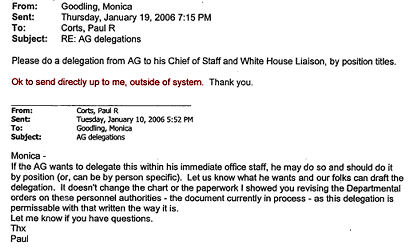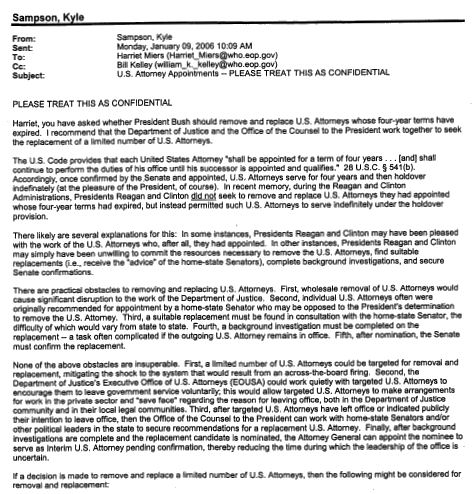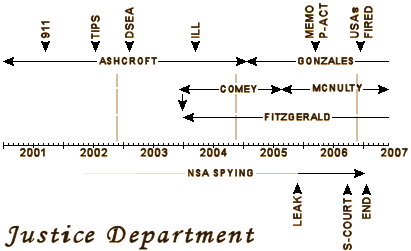Bush’s long history of tilting Justice
The administration began skewing federal law enforcement before the current U.S. attorney scandal, says a former Department of Justice lawyer
By Joseph D. Rich … JOSEPH D. RICH was chief of the voting section in the Justice Department’s civil right division from 1999 to 2005. He now works for the Lawyers’ Committee for Civil Rights Under Law. |
THE SCANDAL unfolding around the firing of eight U.S. attorneys compels the conclusion that the Bush administration has rewarded loyalty over all else. A destructive pattern of partisan political actions at the Justice Department started long before this incident, however, as those of us who worked in its civil rights division can attest.
I spent more than 35 years in the department enforcing federal civil rights laws — particularly voting rights. Before leaving in 2005, I worked for attorneys general with dramatically different political philosophies — from John Mitchell to Ed Meese to Janet Reno. Regardless of the administration, the political appointees had respect for the experience and judgment of longtime civil servants.
Under the Bush administration, however, all that changed. Over the last six years, this Justice Department has ignored the advice of its staff and skewed aspects of law enforcement in ways that clearly were intended to influence the outcome of elections.
It has notably shirked its legal responsibility to protect voting rights. From 2001 to 2006, no voting discrimination cases were brought on behalf of African American or Native American voters. U.S. attorneys were told instead to give priority to voter fraud cases, which, when coupled with the strong support for voter ID laws, indicated an intent to depress voter turnout in minority and poor communities.
At least two of the recently fired U.S. attorneys, John McKay in Seattle and David C. Iglesias in New Mexico, were targeted largely because they refused to prosecute voting fraud cases that implicated Democrats or voters likely to vote for Democrats.
This pattern also extended to hiring. In March 2006, Bradley Schlozman was appointed interim U.S. attorney in Kansas City, Mo. Two weeks earlier, the administration was granted the authority to make such indefinite appointments without Senate confirmation. That was too bad: A Senate hearing might have uncovered Schlozman’s central role in politicizing the civil rights division during his three-year tenure.
Schlozman, for instance, was part of the team of political appointees that approved then-House Majority Leader Tom DeLay’s plan to redraw congressional districts in Texas, which in 2004 increased the number of Republicans elected to the House. Similarly, Schlozman was acting assistant attorney general in charge of the division when the Justice Department OKd a Georgia law requiring voters to show photo IDs at the polls. These decisions went against the recommendations of career staff, who asserted that such rulings discriminated against minority voters. The warnings were prescient: Both proposals were struck down by federal courts.
Schlozman continued to influence elections as an interim U.S. attorney. Missouri had one of the closest Senate races in the country last November, and a week before the election, Schlozman brought four voter fraud indictments against members of an organization representing poor and minority people. This blatantly contradicted the department’s long-standing policy to wait until after an election to bring such indictments because a federal criminal investigation might affect the outcome of the vote. The timing of the Missouri indictments could not have made the administration’s aims more transparent.
This administration is also politicizing the career staff of the Justice Department. Outright hostility to career employees who disagreed with the political appointees was evident early on. Seven career managers were removed in the civil rights division. I personally was ordered to change performance evaluations of several attorneys under my supervision. I was told to include critical comments about those whose recommendations ran counter to the political will of the administration and to improve evaluations of those who were politically favored.
Morale plummeted, resulting in an alarming exodus of career attorneys. In the last two years, 55% to 60% of attorneys in the voting section have transferred to other departments or left the Justice Department entirely.
At the same time, career staff were nearly cut out of the process of hiring lawyers. Control of hiring went to political appointees, so an applicant’s fidelity to GOP interests replaced civil rights experience as the most important factor in hiring decisions.
For decades prior to this administration, the Justice Department had successfully kept politics out of its law enforcement decisions. Hopefully, the spotlight on this misconduct will begin the process of restoring dignity and nonpartisanship to federal law enforcement. As the 2008 elections approach, it is critical to have a Justice Department that approaches its responsibility to all eligible voters without favor.
If it looks like I quoted the whole article, I did. It was too important to remove a single word. This man was a career DoJ employee until 2005. He’s the second real "insider" to speak out that I know of. James Comey, former Deputy Attorney General, spoke only when summoned to a Congressional Hearing. Joseph Rich is speaking on his own. There are plenty of people that know what this Administration has done to our Justice Department – turning it into an arm of the Republican Party, specifically designed to influence the outcome of our elections.
The testimony this week by Bradley Schlozman, a blatant political operative, was infuriating. In that testimony, he claimed that his bringing the ACORN suit four days before a closely contested election [counter to the DoJ guidelines] was approved by the author of those guidelines, Craig Donsanto, the director of the election crimes branch at the DoJ. Here’s what David Iglesias, one of the fired U.S. Attorneys had to say about that:
Former U.S. Attorney for New Mexico David Iglesias said he finds Bradley Schlozman’s testimony about Craig Donsanto unbelievable.
…
Donsanto is a career attorney at the Justice Department who literally wrote the book on Justice Department policy. One of the policies he outlines bars US attorneys from bringing election fraud cases before an election to prevent a chilling effect on voters.
Iglesias oversaw a voter fraud task force from 2004 until the summer of 2006 in New Mexico. He said during that time he consulted Donsanto on numerous occasions, including just before the 2004 election because the elections crime director was known as a "wise old owl when it came to voter fraud cases."
I asked Iglesias about an email we flagged yesterday that he had sent to a Justice Department aide saying there would be no indictments before the 2004 election because Donsanto would never approve it.
"I actually saw the email that I sent on TPMmuckraker and I know exactly what you’re talking about,” he said. “I had numerous conversations with [Donsanto] over the course of two years, I can’t believe that he’d have gone 180 degrees on that policy," Iglesias said. "I just don’t believe it."
Iglesias was in touch with Donsanto up until the summer of 2006, just before Schlozman would have received approval to bring the indictments. Iglesias said he can’t imagine a scenario where Donsanto would have changed his mind on the department’s voter fraud policy.
“Giving Brad Schlozman the benefit of the doubt, he must have completely misunderstood what Donsanto told him,” Iglesias said.
I’m less willing to give Bradley Schlozman any benefit of the doubt [it’s tough to have a personality that turns people off as quickly as he did]. In the hearings, Schumer implied that Craig Donsanto would be asked about this. I hope Schumer follows through with that. And how about calling those "Seven career managers" who "were removed in the civil rights division" to testify.
There are lots of whistles to be blown. Let the symphony begin…


 Following publication of this story, White House Deputy Press Secretary Tony Fratto sent a sharply worded response to The Hill.
Following publication of this story, White House Deputy Press Secretary Tony Fratto sent a sharply worded response to The Hill.








